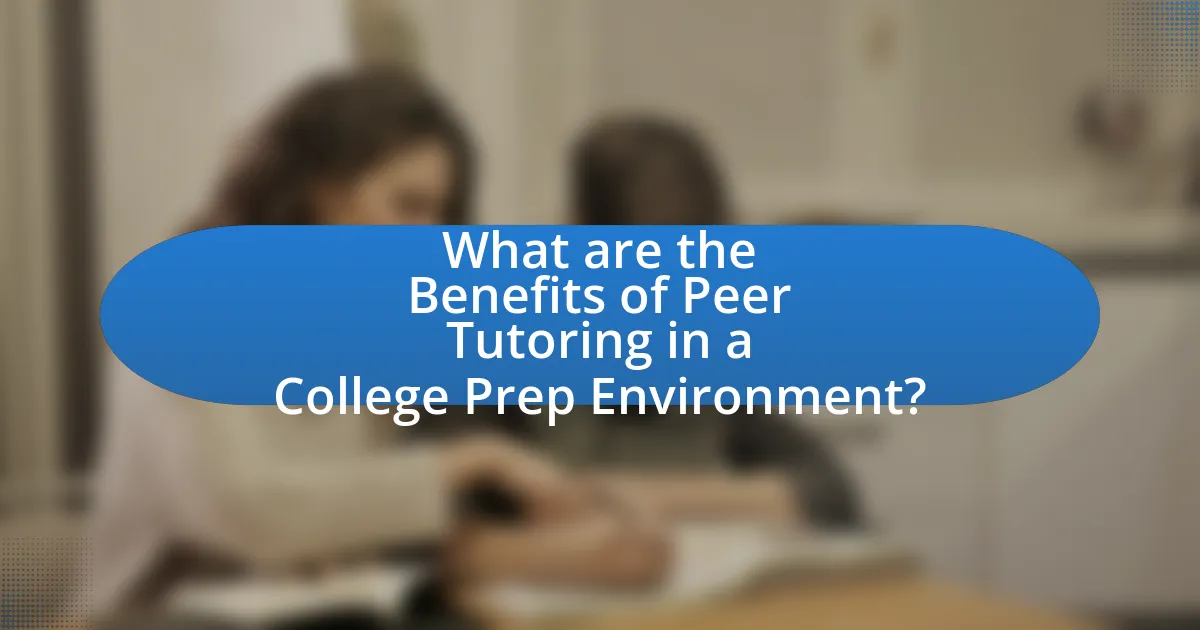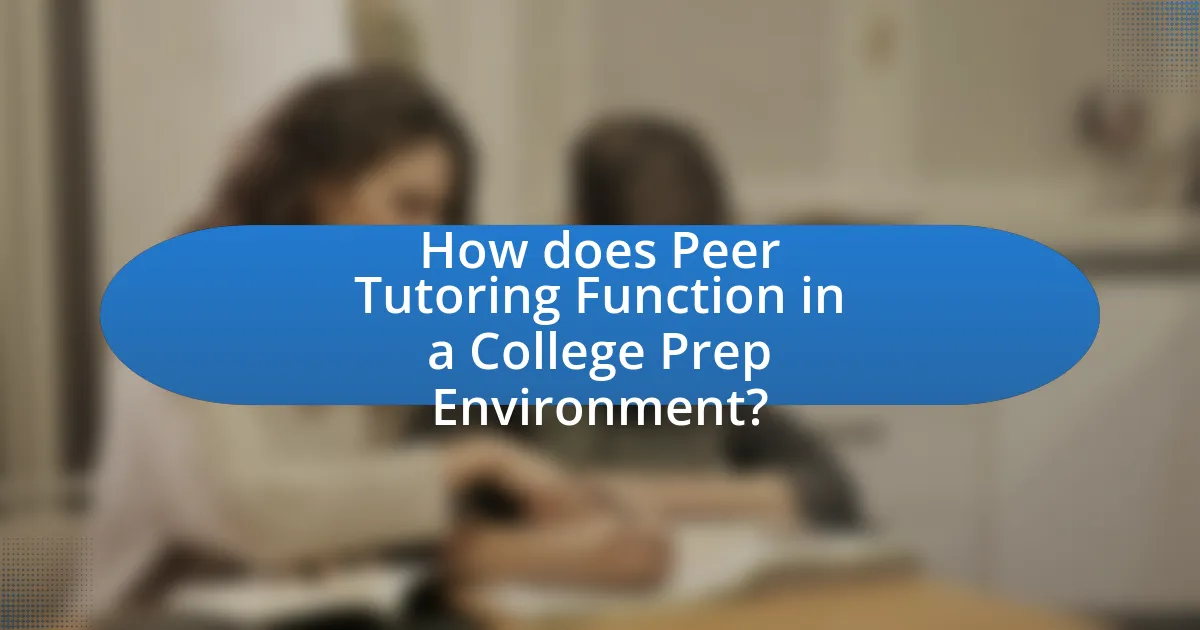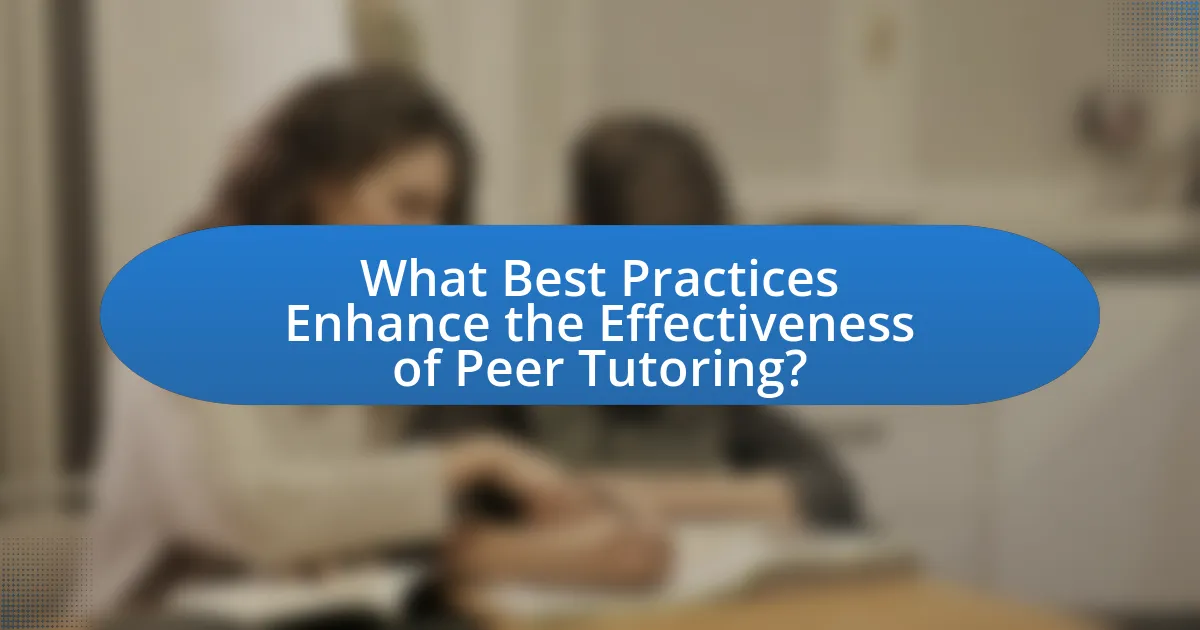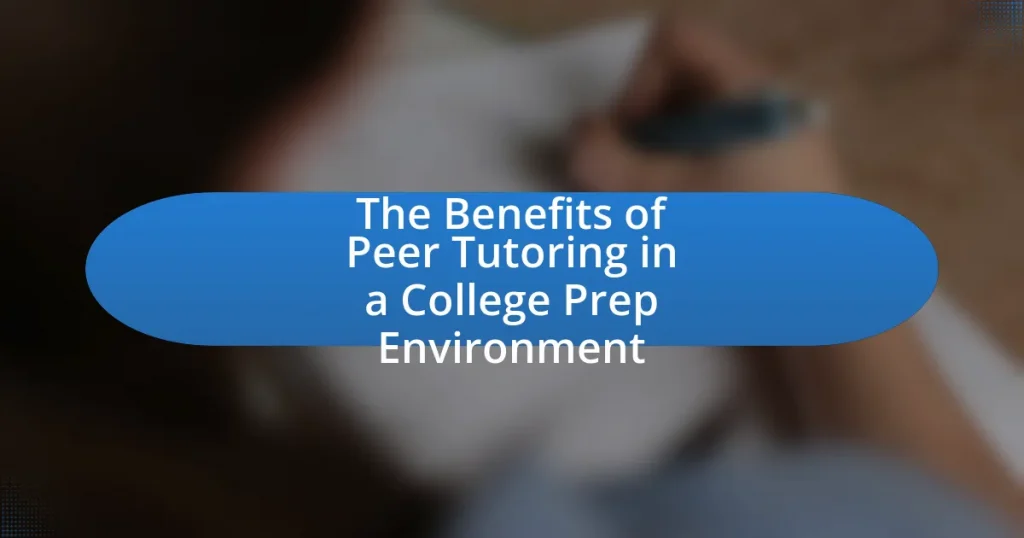Peer tutoring in a college prep environment significantly enhances academic performance and social skills among students. Research shows that participants in peer tutoring programs often achieve higher grades, develop better comprehension of subjects, and improve their communication, leadership, and critical thinking abilities. The article explores the mechanisms through which peer tutoring functions, including its impact on grades, test scores, and emotional well-being, while also addressing the importance of structured sessions, effective feedback, and the role of technology in facilitating these interactions. Additionally, it highlights best practices for implementing successful peer tutoring initiatives and the challenges these programs may face.

What are the Benefits of Peer Tutoring in a College Prep Environment?
Peer tutoring in a college prep environment enhances academic performance and fosters social skills. Research indicates that students who engage in peer tutoring often achieve higher grades and develop a deeper understanding of the material, as they explain concepts to their peers, reinforcing their own knowledge. Additionally, peer tutoring promotes collaboration and communication skills, which are essential for success in college and beyond. A study published in the Journal of Educational Psychology found that peer tutoring can lead to a 20% increase in student performance, demonstrating its effectiveness in preparing students for higher education.
How does peer tutoring enhance academic performance?
Peer tutoring enhances academic performance by facilitating collaborative learning, which improves understanding and retention of material. Research indicates that students who engage in peer tutoring often achieve higher grades and demonstrate better comprehension of subjects compared to those who do not participate in such programs. A study published in the “Journal of Educational Psychology” by Topping (2005) found that peer tutoring can lead to an average improvement of 20% in academic performance, highlighting its effectiveness in reinforcing knowledge through teaching and discussion.
What specific skills do students develop through peer tutoring?
Students develop several specific skills through peer tutoring, including communication, leadership, and critical thinking. Communication skills are enhanced as students explain concepts and provide feedback to their peers, fostering clarity and understanding. Leadership skills are cultivated as students take on the role of tutors, guiding their peers and managing learning sessions. Critical thinking skills are developed as students analyze their peers’ questions and adapt their explanations to meet diverse learning needs. Research indicates that peer tutoring can lead to improved academic performance and greater self-efficacy among students, reinforcing the effectiveness of these skill developments.
How does peer tutoring impact grades and test scores?
Peer tutoring positively impacts grades and test scores by enhancing understanding and retention of material. Research indicates that students who participate in peer tutoring programs often experience significant improvements in academic performance; for instance, a meta-analysis by Topping (2005) found that peer tutoring can lead to an average increase of 0.5 standard deviations in student achievement. This improvement is attributed to the collaborative learning environment, where students explain concepts to one another, reinforcing their own knowledge while helping peers. Additionally, a study published in the Journal of Educational Psychology by Roscoe and Chi (2007) demonstrated that peer tutors often outperform their non-tutoring counterparts in assessments, further validating the effectiveness of peer tutoring in boosting academic outcomes.
Why is peer tutoring important for social development?
Peer tutoring is important for social development because it fosters collaboration and communication skills among students. Engaging in peer tutoring allows individuals to interact with their peers, enhancing their ability to work in teams and develop empathy. Research indicates that students involved in peer tutoring programs often show improved social skills, as they learn to navigate diverse perspectives and build relationships. For instance, a study published in the Journal of Educational Psychology found that peer tutoring significantly increased students’ social interactions and reduced feelings of isolation, demonstrating its effectiveness in promoting social development within educational settings.
How does peer tutoring foster communication skills among students?
Peer tutoring fosters communication skills among students by creating an interactive learning environment where they engage in dialogue, explain concepts, and ask questions. This process enhances verbal articulation and active listening, as students must convey their understanding clearly and respond to their peers’ inquiries. Research indicates that peer tutoring improves communication proficiency; for instance, a study published in the “Journal of Educational Psychology” by Topping (2005) found that students involved in peer tutoring programs exhibited significant gains in both their speaking and listening skills. This collaborative approach not only builds confidence in communication but also encourages the development of empathy and social awareness, essential components of effective interpersonal interactions.
What role does peer tutoring play in building confidence?
Peer tutoring plays a significant role in building confidence among students by providing a supportive learning environment where they can engage with peers in a less intimidating setting. This interaction allows students to ask questions freely, receive immediate feedback, and reinforce their understanding of the material, which enhances their self-efficacy. Research indicates that students who participate in peer tutoring often report increased academic confidence and improved social skills, as they learn to communicate effectively and collaborate with others. For instance, a study published in the Journal of Educational Psychology found that peer tutoring not only improved academic performance but also significantly boosted students’ self-esteem and confidence levels in their abilities.
What are the emotional benefits of peer tutoring?
Peer tutoring provides significant emotional benefits, including increased self-esteem and reduced anxiety among participants. Engaging in peer tutoring allows students to develop a sense of belonging and support, which can enhance their confidence in academic abilities. Research indicates that students who tutor others often experience a boost in self-worth as they recognize their knowledge and skills are valuable to their peers. Additionally, the collaborative nature of peer tutoring fosters positive relationships, which can alleviate feelings of isolation and stress, contributing to a more supportive learning environment. Studies have shown that students involved in peer tutoring report lower levels of anxiety and greater emotional resilience, highlighting the positive impact of these interactions on mental well-being.
How does peer tutoring reduce anxiety and stress in students?
Peer tutoring reduces anxiety and stress in students by fostering a supportive learning environment where students feel comfortable asking questions and expressing difficulties. This collaborative approach enhances understanding and retention of material, which can alleviate feelings of inadequacy and fear of failure. Research indicates that peer tutoring can lead to improved academic performance, which correlates with lower stress levels; for instance, a study published in the Journal of Educational Psychology found that students who participated in peer tutoring reported significantly lower anxiety levels compared to those who did not engage in such programs. Additionally, the social interaction inherent in peer tutoring helps build relationships and a sense of belonging, further contributing to reduced anxiety and stress among students.
What impact does peer tutoring have on student motivation?
Peer tutoring significantly enhances student motivation by fostering a collaborative learning environment. When students engage in peer tutoring, they often experience increased confidence in their abilities, as teaching others reinforces their own understanding of the material. Research indicates that students who participate in peer tutoring report higher levels of intrinsic motivation, as they feel a sense of responsibility and accomplishment in helping their peers succeed. A study published in the “Journal of Educational Psychology” by Topping (2005) found that peer tutoring not only improves academic performance but also boosts motivation levels among both tutors and tutees, creating a positive feedback loop that encourages continued engagement in learning activities.

How does Peer Tutoring Function in a College Prep Environment?
Peer tutoring functions in a college prep environment by facilitating collaborative learning between students, where more knowledgeable peers assist those who may struggle with academic material. This approach enhances understanding of complex subjects, as peer tutors often explain concepts in relatable terms, making learning more accessible. Research indicates that peer tutoring can lead to improved academic performance; for instance, a study published in the “Journal of Educational Psychology” by Topping (2005) found that students involved in peer tutoring showed significant gains in their grades and comprehension levels compared to those who did not participate. Additionally, peer tutoring fosters a supportive community, encouraging students to engage with one another and develop essential social skills, which are crucial for success in college and beyond.
What are the different models of peer tutoring?
The different models of peer tutoring include the one-to-one model, the small group model, and the cross-age tutoring model. The one-to-one model involves a single tutor assisting a single tutee, which allows for personalized attention and tailored instruction. The small group model consists of one tutor working with multiple students, promoting collaborative learning and peer interaction. The cross-age tutoring model features older students tutoring younger ones, fostering mentorship and reinforcing the tutor’s knowledge through teaching. Research indicates that these models enhance academic performance and social skills among participants, demonstrating their effectiveness in educational settings.
How do one-on-one sessions differ from group tutoring?
One-on-one sessions provide personalized attention tailored to an individual student’s needs, while group tutoring offers a collaborative environment where multiple students learn together. In one-on-one sessions, the tutor can focus exclusively on the specific challenges and learning pace of a single student, allowing for customized lesson plans and immediate feedback. In contrast, group tutoring encourages peer interaction and discussion, which can enhance understanding through diverse perspectives but may not address individual learning gaps as effectively. Research indicates that personalized instruction in one-on-one settings can lead to improved academic performance, as highlighted in a study by the National Bureau of Economic Research, which found that individualized tutoring significantly boosts student achievement compared to group settings.
What is the role of technology in peer tutoring?
Technology plays a crucial role in peer tutoring by facilitating communication and collaboration between students. It enables the use of online platforms and tools that allow tutors and tutees to connect, share resources, and engage in real-time discussions, regardless of their physical location. For instance, video conferencing tools like Zoom and collaborative platforms like Google Docs enhance the tutoring experience by providing interactive environments where students can work together effectively. Research indicates that technology integration in peer tutoring can lead to improved academic performance, as it allows for personalized learning experiences and immediate feedback, which are essential for student engagement and understanding.
How are peer tutors selected and trained?
Peer tutors are selected based on academic performance, communication skills, and recommendations from faculty. The selection process often includes an application, an interview, and a review of academic records to ensure that candidates possess the necessary knowledge and interpersonal skills to assist their peers effectively.
Training for peer tutors typically involves workshops that cover tutoring techniques, effective communication strategies, and understanding diverse learning styles. These training sessions are designed to equip tutors with the skills needed to facilitate learning and provide support in a college prep environment.
What qualifications should peer tutors possess?
Peer tutors should possess strong academic proficiency in the subjects they tutor, effective communication skills, and a demonstrated ability to relate to and motivate their peers. Academic proficiency ensures that tutors have a deep understanding of the material, which is essential for providing accurate assistance. Effective communication skills enable tutors to explain concepts clearly and adapt their teaching methods to suit different learning styles. Additionally, the ability to relate to peers fosters a supportive learning environment, which is crucial for encouraging engagement and confidence in students. Research indicates that peer tutoring can enhance academic performance and social skills, making these qualifications vital for successful tutoring outcomes.
How does training enhance the effectiveness of peer tutors?
Training enhances the effectiveness of peer tutors by equipping them with essential skills and strategies for effective teaching and communication. This preparation allows peer tutors to better understand diverse learning styles, enabling them to tailor their approaches to meet individual student needs. Research indicates that trained peer tutors demonstrate improved instructional techniques, leading to higher student engagement and academic performance. For instance, a study published in the Journal of Educational Psychology found that peer tutors who received training showed a 20% increase in student comprehension compared to untrained tutors. This evidence underscores the critical role of training in maximizing the impact of peer tutoring in educational settings.
What challenges do peer tutoring programs face?
Peer tutoring programs face several challenges, including inconsistent participation from both tutors and tutees, varying levels of commitment, and potential mismatches in skill levels. Research indicates that inconsistent attendance can hinder the effectiveness of tutoring sessions, as noted in a study by Topping (2005), which highlights that regular engagement is crucial for successful outcomes. Additionally, tutors may lack training or experience, leading to ineffective teaching methods, while tutees may feel intimidated or reluctant to seek help, further complicating the tutoring dynamic. These factors collectively impact the overall success and sustainability of peer tutoring initiatives.
How can programs address issues of mismatched skill levels?
Programs can address issues of mismatched skill levels by implementing tailored peer tutoring systems that pair students with varying competencies. This approach allows more advanced students to reinforce their knowledge by teaching others, while those with less experience receive personalized support that caters to their specific learning needs. Research indicates that peer tutoring can enhance academic performance, as evidenced by a study published in the “Review of Educational Research,” which found that students involved in peer tutoring showed significant improvement in their understanding of complex subjects. By fostering collaboration and individualized learning, programs can effectively bridge skill gaps and promote a more equitable educational environment.
What strategies can be implemented to maintain engagement?
To maintain engagement in a peer tutoring environment, implementing structured sessions with clear objectives is essential. This approach ensures that both tutors and tutees understand the goals of each meeting, fostering a focused and productive atmosphere. Research indicates that goal-setting can enhance motivation and accountability, leading to improved learning outcomes (Locke & Latham, 2002). Additionally, incorporating interactive activities, such as group discussions and problem-solving tasks, can further stimulate participation and interest. Studies show that active learning strategies significantly increase student engagement and retention of information (Freeman et al., 2014). Regular feedback and recognition of progress also play a crucial role in sustaining engagement, as they reinforce the value of effort and achievement in the learning process.

What Best Practices Enhance the Effectiveness of Peer Tutoring?
Effective peer tutoring is enhanced by establishing clear goals, fostering a supportive environment, and utilizing structured sessions. Clear goals ensure that both tutors and tutees understand the objectives, which can lead to improved learning outcomes. A supportive environment encourages open communication and builds confidence, allowing students to engage more fully in the learning process. Structured sessions, which include specific activities and time management, help maintain focus and maximize the effectiveness of the tutoring experience. Research indicates that these practices lead to higher academic performance and greater satisfaction among participants, as evidenced by studies showing that structured peer tutoring programs can improve student grades by an average of 10-15%.
How can peer tutoring sessions be structured for maximum benefit?
Peer tutoring sessions can be structured for maximum benefit by implementing a clear framework that includes goal setting, regular feedback, and diverse learning activities. Establishing specific learning objectives at the beginning of each session helps both tutors and tutees focus on desired outcomes, enhancing accountability and motivation. Regular feedback mechanisms, such as self-assessments and peer evaluations, foster continuous improvement and reinforce learning. Incorporating a variety of instructional methods, such as collaborative problem-solving, discussions, and hands-on activities, caters to different learning styles and keeps participants engaged. Research indicates that structured peer tutoring can lead to improved academic performance, with studies showing that students involved in peer tutoring often achieve higher grades and develop better study habits compared to those who do not participate.
What techniques can tutors use to facilitate learning?
Tutors can use techniques such as scaffolding, active learning, and formative assessment to facilitate learning. Scaffolding involves breaking down complex tasks into manageable parts, allowing students to build understanding progressively. Active learning engages students through discussions, problem-solving, and collaborative activities, which enhances retention and comprehension. Formative assessment provides ongoing feedback, enabling tutors to adjust their teaching strategies based on student performance and understanding. Research indicates that these techniques significantly improve student engagement and academic outcomes, as evidenced by studies showing that active learning can increase student performance by up to 50% compared to traditional methods.
How can feedback be effectively integrated into tutoring sessions?
Feedback can be effectively integrated into tutoring sessions by establishing a structured approach that encourages continuous dialogue between the tutor and the student. This involves setting clear objectives for each session, allowing the tutor to provide specific, actionable feedback that aligns with those goals. Research indicates that timely feedback enhances learning outcomes; for instance, a study published in the “Journal of Educational Psychology” by Hattie and Timperley (2007) found that feedback significantly influences student achievement when it is specific and constructive. Additionally, incorporating self-assessment opportunities enables students to reflect on their understanding and progress, fostering a more engaged learning environment.
What resources are available to support peer tutoring initiatives?
Peer tutoring initiatives can be supported by various resources, including training programs, educational materials, and institutional support. Training programs, such as those offered by the National Tutoring Association, provide tutors with essential skills and strategies for effective tutoring. Educational materials, including textbooks, online resources, and tutoring software, enhance the learning experience and provide structured content for tutors and students. Institutional support, such as funding, dedicated spaces for tutoring sessions, and administrative backing, is crucial for the sustainability and effectiveness of peer tutoring programs. These resources collectively contribute to the success of peer tutoring initiatives in a college prep environment.
How can institutions provide training and materials for tutors?
Institutions can provide training and materials for tutors by developing structured training programs that include workshops, online courses, and resource libraries. These programs should focus on pedagogical techniques, subject-specific knowledge, and communication skills essential for effective tutoring. For instance, a study by the National Tutoring Association highlights that comprehensive training enhances tutor effectiveness and student outcomes. Additionally, institutions can create accessible materials such as guides, lesson plans, and assessment tools to support tutors in their roles, ensuring they have the necessary resources to facilitate learning effectively.
What role do faculty and staff play in supporting peer tutoring?
Faculty and staff play a crucial role in supporting peer tutoring by facilitating the program’s structure, providing resources, and fostering a positive learning environment. They help in training peer tutors, ensuring they possess the necessary skills to assist their peers effectively. Additionally, faculty and staff often promote peer tutoring initiatives, encouraging student participation and engagement. Research indicates that when faculty actively support tutoring programs, student retention and academic performance improve, as seen in studies conducted by the National Tutoring Association, which highlight the correlation between faculty involvement and student success rates.
What are some tips for students participating in peer tutoring?
Students participating in peer tutoring should actively engage in clear communication and establish a supportive learning environment. Effective communication enhances understanding, allowing both tutors and tutees to express their thoughts and questions freely. Additionally, creating a positive atmosphere encourages collaboration and reduces anxiety, which is crucial for effective learning. Research indicates that peer tutoring can improve academic performance and foster social skills, as seen in studies conducted by Topping (2005) in the “Educational Psychology” journal, which highlights the benefits of peer-assisted learning strategies.


